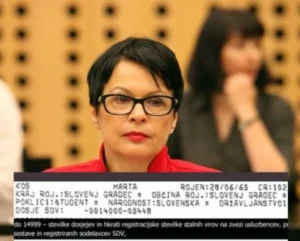The former Yugoslav secret police, known as the Directorate for State Security or UDBA, was in many ways worse than similar Soviet-style agencies. It was known for hunting down and killing political dissidents abroad, many of them innocent people. It was also famous for torture, kidnappings and bombings, and “rigged” trials, targeting real (and phantom) opponents of the regime. In recent days, we have been reading more about it again, because the foreign media mobilised for the public moral detox of former Yugoslavian agent Marta Kos, Slovenia’s candidate for the position of European Commissioner.
UDBA – the former Yugoslav secret police – was an utterly brutal tool of the post-war communist government. It was a tool of the paranoid authorities to uncover real and imaginary opponents of the undemocratic regime. Even abroad, it stalked emigrant democrats (some of them were giants of Slovenian independence, such as Dimitrij Rupel, Igor Bavčar, Janez Janša, France Bučar and Franc Jeza).
From torturing the innocent to false testimonies
The secret police stalked both domestic and foreign journalists, priests, and the rejected Slovenian and Yugoslav communists (e.g. Ranković, Kavčič, Djilas). It even carried out assassinations abroad (even of foreign politicians), liquidations, bombings and kidnappings, according to an expert on the topic, Igor Omerza.

It was also famous for its rigged trials, where unsuspecting innocent individuals (even politically disinterested musicians and cultural figures) were tortured into giving false testimonies. It has also sent many to serve prison sentences on Goli Otok – a barren, uninhabited island that was used as a political prison during the time of Yugoslavia.
One X user by the name of John Schindler even highlighted all of its atrocities in a tweet, writing: “UDBA/SDB was the Cold War’s nastiest intelligence service. It liquidated around 100 members of the “enemy emigration” in the West, 1965-90 — some nasty types and war criminals among them, but many were mere dissidents. They even murdered kids. Never forget this.”
George Soros and the “whitewashing” of the public image
Why is this important? Because apologists have now emerged abroad and in Slovenia (for example, the Delo newspaper journalist Peter Žerjavič), who are trying to “whitewash” the public image of the Directorate for State Security, thus making its former collaborator, Marta Kos, a more acceptable candidate for the position of European Commissioner. This was thoroughly addressed on the Euronews portal, where the author Aleksandar Brezar (mentioned as a Bosnian journalist with links to the financial speculator George Soros, also linked to the “depoliticised” chairman of the council of Slovenia’s national media outlet Radio-Television Slovenia, Goran Forbici), predictably declared the opposition Slovenian Democratic Party (Slovenska demokratska stranka – SDS) to be a “right-wing populist” party.
This diminished the weight of the party’s (or its MEP Romana Tomc‘s) statements comparing the Directorate for State Security to the East German Stasi. He went on to say that critics of the UDBA often point to “its extreme examples, including extrajudicial killings” and that in the countries that emerged from the former Yugoslavia, the right a priori sees everything as negative. The author is convinced that the Directorate for State Security cannot be compared with other secret services of the former Eastern Bloc.
Disparagement and “Coca-Cola Communism”
Brezar believes that this has to do with the fact that Yugoslavian society was considerably freer than East German society. East Germany was the product of Soviet occupation, but Yugoslavia, he claims, was “independent”. Belgrade was, in effect, chasing a balance between two blocs. The version of communism that was to be established in Yugoslavia as a consequence was described by him as “Coca-Cola communism.” Finally, the author tried to relativise the importance and position of Kos in the organisation.
Domen Mezeg


